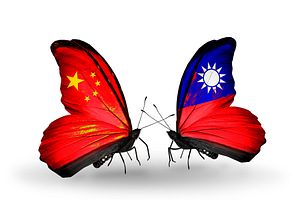China’s top official for cross-strait relations is close to wrapping up his landmark visit to Taiwan. Zhang Zhijun arrived on the island on Wednesday, making him the first-ever head of the mainland’s Taiwan Affairs Office (TAO) to visit Taiwan.
Zhang met with his counterpart, Wang Yu-chi of the Mainland Affairs Council (MAC) on Wednesday. According to Taiwan’s Central News Agency, Zhang and Wang held further discussions on the establishment of representative offices between Taiwan and China. The details are still being hammered out — one achievement of the meeting was an agreement that staff of the representative offices will be able to visit detainees being held by the other side.
Zhang and Wang also agreed to study issues relating to Taiwan’s involvement in the Trans-Pacific Partnership (TPP) and Regional Comprehensive Economic Partnership (RCEP). Taiwan’s President Ma Ying-jeou hoped that reaching a trade agreement with China first would make Beijing less hostile to Taipei’s attempts to join multilateral trade agreements like TPP and RCEP. The mainland, for its part, is theoretically willing to allow Taiwan to join international organizations that do not require statehood as a prerequisite for membership. In practice, however, Beijing remains highly sensitive to Taiwanese participation in any international organization, state-based or not.
Even more interesting than Zhang’s official talks with Wang, though, were his attempts to connect with Taiwanese society at large. Zhang spent a sizeable chunk of his visit in southern Taiwan, traditionally a stronghold of the opposition Democratic Progress Party (DPP) and of pro-independence, anti-China sentiment. Zhou Zhihuai, the director of the Institute of Taiwan Studies at the Chinese Academy of Social Sciences, noted in a speech in Beijing that China is adopting a new strategy toward cross-strait relations, one that seeks to be “closer to the people.” In other words, China is bolstering its top-down approach with an attempt at building cross-strait relations at the grassroots level.
Zhang’s visit this week underscored this new focus, as Zhang spent most of his time talking with different interest groups. As Zhang told New Taipei’s mayor in their meeting, “I really got involved in Taiwan’s society.” This is a change for China, which had previously focused its efforts almost exclusively on fomenting good relationships with officials from the ruling Chinese Nationalist Party (KMT). In the wake of the Sunflower Movement, the mainland seems to be getting serious about winning the “hearts and minds” of Taiwan’s people.
The outreach wasn’t entirely smooth. Zhang was met with a few limited protests in Taipei, but when he arrived in southern Taiwan, almost his entire trip was dogged by protestors. Hundreds of protestors were waiting for Zhang as he arrived at the train station in the city of Kaohsiung. Some of the protestors even threw paint and objects at Zhang’s car, according to Taipei Times. There were also counter-protests by a group of pro-China supporters. Kaohsiung Mayor Chen Chu told Zhang that the protests were merely “a very normal part of Taiwan’s democracy.”
During his visit to Kaohsiung, including his meeting with Chen, Zhang adopted a fairly conciliatory stance. He told journalists, “We know that Taiwan people cherish very much the social system and the life style they have chosen. We in mainland China respect what Taiwanese people have chosen,” according to Reuters. Zhang’s quote seemed to be an oblique reference to a quote from TAO spokesperson Fan Liqing, who said earlier that the future of Taiwan should be decided not by the Taiwanese alone, but by the combined population of Taiwan and the mainland. Chen said that she conveyed to Zhang that such comments “were not acceptable to the ruling and opposition parties in Taiwan.”
Chen’s meeting with Zhang represents increased efforts by both sides to build up a working relationship between the DPP and mainland China. Chen has previously visited China herself, showing the DPP’s willingness to engage with Beijing. Zhang’s decision to include a pro-DPP stronghold on his itinerary likewise showed a new desire to deal with both of Taiwan’s main political parties. Chen was coy but optimistic as to whether more meetings were in the works. “As to whether there will be more high-level exchanges between the two sides, I can only say: Each side has extended an olive branch and is more likely to get to know each other,” Taipei Times quoted her as saying.
Not everyone is happy with this “olive branch,” however. Some of the anti-Zhang protestors also had sharp words for Chen, accusing her of selling out human rights in order to gain economic prosperity. Such comments are a sharp reminder that many in Taiwan will never be comfortable with mainland China absent extensive political reform by Beijing.

































